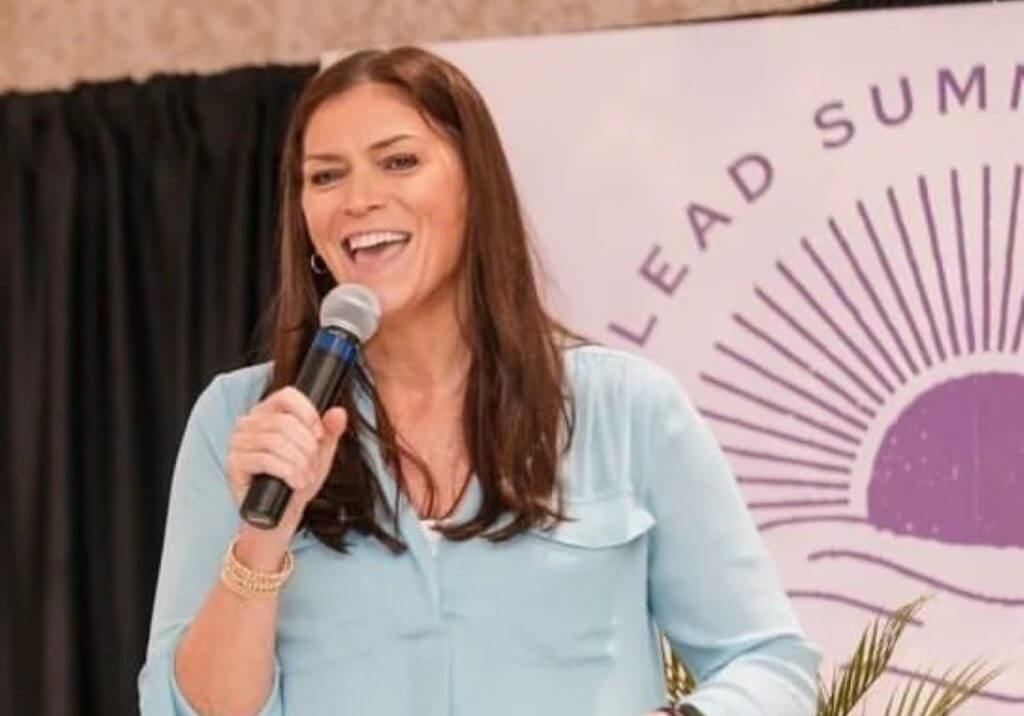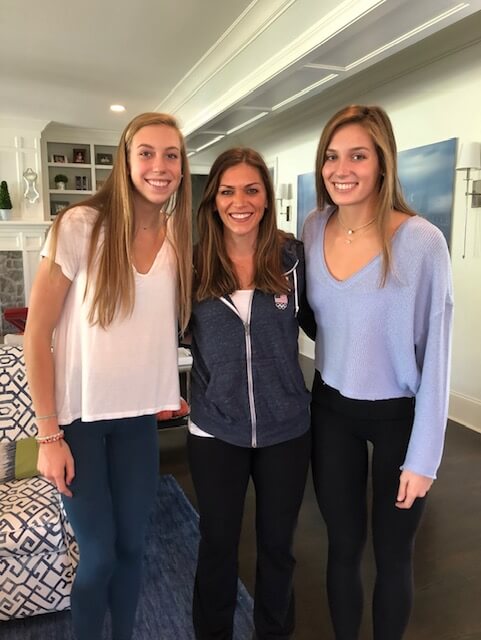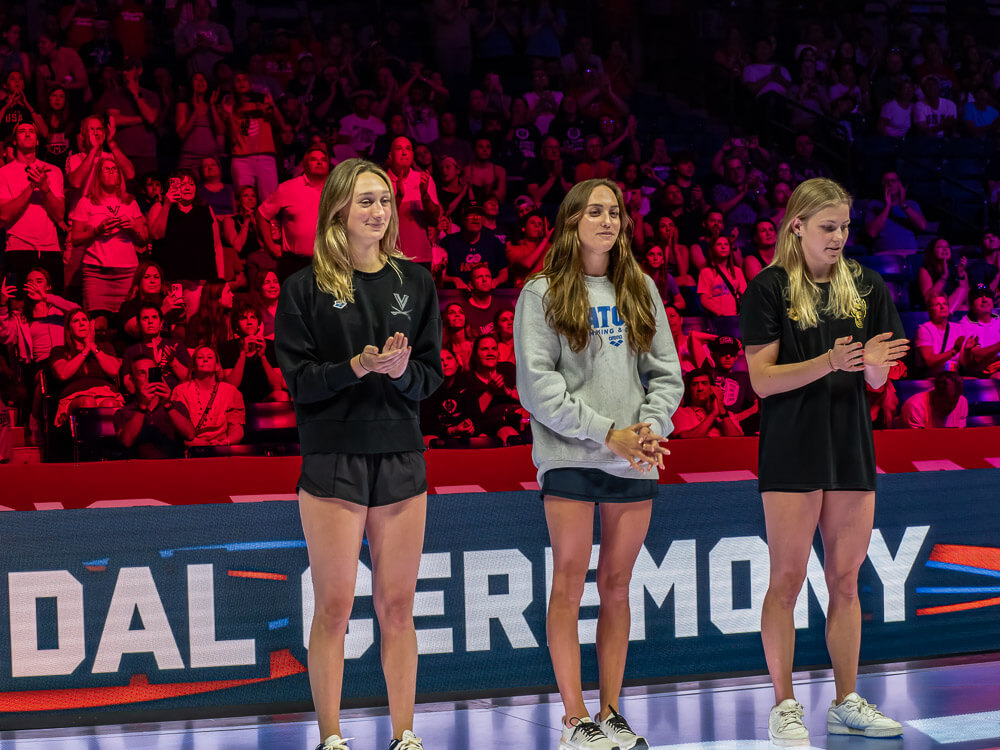Meet Christen Shefchunas, the Confidence Coach Behind Some of Team USA’s Biggest Stars

Meet Christen Shefchunas, the Confidence Coach Behind Some of Team USA’s Biggest Stars
Christen Shefchunas isn’t bashful about the emotions that a meet like U.S. Olympic Trials conjures. Sitting at her Atlanta home, seeing dozens of swimmers she’s worked with compete on a notoriously unforgiving stage, Shefchunas cried right along with them, in joy and in dejection. She cheered from her couch and turned herself into “a basket case” in shared mourning with her swimmers.
To do otherwise would betray the central tenet of her work. Shefchunas labels herself a professional confidence coach. After an All-American career in the pool and more than a decade as a college coach, Shefchunas works one-on-one with some of American swimming’s biggest stars, work so influential that her pupils cited it time and again from the podium at Lucas Oil Stadium.
The first step, Shefchunas said, is zeroing in on the emotions – what scares a swimmer, what occupies their minds, what keeps them from performing.
“The first place I go immediately when I start working with somebody is we dive right into fear,” Shefchunas said by phone. “These elite athletes that have so much talent and work so hard and it’s not translating, mostly it’s the mental piece of it. I’m a very big believer that a big way of us trying to find control in a really scary situation is to try to figure out what’s going to happen. And unfortunately, when we try to predict what’s going to happen, often we end up in some worst-case scenarios and you almost start preparing yourself for those worst-case scenarios.”
Shefchunas’ website reflects the core of the U.S. women’s national team the last two Olympic cycles. New world record holder Gretchen Walsh has worked with Shefchunas, as did sister Alex Walsh when they were in high school. Katharine Berkoff and Emma Weber both sung her praises in Indy. Shefchunas has worked with U.S. open water Olympian Mariah Denigan, and 2021 Olympians Natalie Hinds, Hali Flickinger and Catie DeLoof.
In a sport where discussing the mental side of competition has been normalized, Shefchunas is one of the go-to names in the mental skills game.
“I would just say, it’s totally changed my career,” Gretchen Walsh said. “I’m going to do it as long as I swim.”
From the Deck to Zoom
Shefchunas’ practice is unique in her deep connection to swimming. She approaches it not from a generalized mental skills performance perspective but with an intimate knowledge of the life of a swimmer.

Coach Christen Shefchunas, center, with Gretchen Walsh, left, ad Alex Walsh; Photo Courtesy: Christen Shefchunas
Shefchunas grew up in Western Pennsylvania and swam at the University of Tennessee, where she was a four-time relay All-American, graduating in 1997. She served as an assistant coach at Michigan State and SMU before a stint as the head coach at the University of Miami, Florida, a career spanning 16 years. She was hired in Coral Gables in the spring of 2006 and resigned in 2013 to embark on personal coaching. It’s been a decade in that practice, around a one-year hiatus to work with Team Elite ahead of the Rio Olympics. After those Games, she dove headlong into her Coach Christen business – one of her early clients was Missy Franklin, recovering from an injury-plagued Rio Games before retiring in 2018.
From both sides of the swimmer/coach divide, Shefchunas has seen how stress and the weight of expectations affect performance. The magnitude of the problem inspired her to chip away at it from the oblique angle of a third party.
“The minute I got somewhat good in swimming, the pressure took me down,” she said. “I have no doubt, and that’s probably one of the reasons why I’m so passionate about what I do. Because when you’re sitting there dealing with these fears and dealing with the pressure and you have nowhere to go with them and nobody’s teaching you how to handle it and you just have to go on and just pretend you’re fine, it just completely ruins careers. I get that from so many people that are former athletes, they’re like, Man, I wish I would have had somebody like you back in the day just to have a safe space to talk this stuff out and learn how to handle it.”
Shefchunas has found her niche in the liminal space between coaching and teaching. She’s emphatic that she has “zero interest” in coaching again in a team setting, though she does speak to teams. In 2021, she published a book, 30 Days to Confident – a 30 Day Confidence Challenge for Female Athletes.
The one-on-one focus and the ability to drill down into the particular challenges of each swimmer is what drives her.
“Swimming is a different sport, and if you weren’t in it, I’m not sure if you can fully understand what’s going on,” she said. “I think it’s a huge advantage.”
Joining Team Christen
Shefchunas’ name came up often in Indianapolis. She’s not the only practitioner working with athletes – many big programs have performance coaches attached, and a number of swimmers detangle aspects of performance and emotions with their personal therapists. But Shefchunas is among the most cited.
“She’s really kind of made me view swimming in a different way and a really positive way,” Weber said. “I just get a lot of confidence. We work on strategies and skills, using our mind before races to look at practices differently, kind of just pick the best out of the work we’re doing and stay positive and content with everything. It’s definitely helped a lot.”
“She’s been super helpful,” Berkoff said. “And my therapist from home, I talked to her a lot about similar things. … Just trying to remember that I swim because I love it, and I’ve had these Olympic dreams since I was born. So just trying to do it because I want to and not because anyone else wants me to and just staying true to myself along the way.”
Shefchunas was at the center of some of Trials’ most triumphant stories on the women’s side. Berkoff was “devastated” not to make the Olympics in 2021. The NC State swimmer has done it all in the pool – individual medals at World Championships both long- and short-course, American records, NCAA marks. But falling short of the Olympics would’ve forever made her resume incomplete, perhaps in her eyes above all. Berkoff shouldered that pressure in Indianapolis and still performed beautifully, the clear second-place finisher in her signature 100 backstroke behind Regan Smith’s world record.
Gretchen Walsh had a similar journey, as one of the most decorated NCAA swimmers in history. But the knock against her was as a short-course specialist. Seeing Alex Walsh make the 2021 Olympics without her, then falling short at 2022 International Team Trials convinced her to start working with Shefchunas again, after both sisters had used her services in high school.
The change Shefchunas sees in Gretchen Walsh is massive, as Walsh is poised to be one of the faces of the American team in Paris after her Trials world record in the 100 fly.
“A lot of it has just been getting her to believe that she’s a fast swimmer, regardless if it’s short-course or long-course,” Shefchunas said. “And that’s taken a lot of work of her finally being honest about those thoughts, because she had had so much failure in long course. There was so much fear there. So a lot of the work has been just dealing with those fears. When she finally got honest with me, we realized that she was just kind of preparing herself for disappointment before she even stepped up on the blocks.”
Shefchunas’ work sounds simple, but its ramifications are career-altering. Once she and a client delve into the underlying emotions – fear, pressure, sadness – they develop coping strategies. Fears leads to panic, which leads to wasted fight-or-flight energy, which hampers performance, which raises fear. Shefchunas helps clients recognize ways to interrupt that cycle, whether it’s simply saying the fear out loud to rob it of power or implementing strategies on race days to diminish variabilities in performance. Some of that is merely pointing out, for someone like Gretchen Walsh, just how much success she’s had on the way to the failure point and realizing the relative weight of each from an objective, outside observer.
“I’ve learned that athletes are really, really bad at giving themselves credit,” she said. “It’s the old saying that they could do 99 things right and one thing wrong and they’re always walking out beating themselves up over that one thing. And so really learning to give themselves credit daily to make sure they’re paying attention to the good stuff that they’re doing because that I think is what gives us confidence that you’re prepared for the big moments.”
Shefchunas estimates that the breakdown of time spent is about 50-50: Half of the time on the day-to-day routine of training and putting in work, half the time on getting ready for the big moments where that work has to shine through.
Celebrating Success, Grieving Failure
Not every story is a success, and Shefchunas’ process requires creating space for grief. For plenty of her swimmers, Trials won’t bring a silver lining. It will force a reset of their goals and a reevaluation of their careers. Those emotions must be embraced, too.
Shefchunas has seen the swimming landscape change in that regard. She swam and coached through era where the ethos was “suck it up.” Talking about struggles, it was thought, invited more. Being open was a sign of weakness, not an avenue to renew strength.

From left, Emma Weber, Emma Weyant and Katharine Berkoff; Photo Courtesy: Peter H. Bick
There’s still more progress to seek on that front. Many of her top clients are female athletes, as are all of the athletes willing to put their faces and names to website testimonials. More male athletes are willing to open up about their mental and emotional struggles – Caeleb Dressel is the avatar for that, while Carson Foster discussed his work with a confidence coach and Jack Alexy described the value of journaling to quell nerves as his profile in swimming has risen. Shefchunas estimates her clientele runs about 80 percent female, though the male proportion is growing.
Shefchunas’ coaching requires a certain level of vulnerability in clients. The first step is to open up, admit where problems may exist and embark on the often messy and uncomfortable process of exploration. In her experience, that step has been easier with female athletes — her book title aimed at female athletes indicates that as an area of focus — but those trends are shifting.
Part of the reason is a general acceptance of mental health in society. Swimmers being able to separate their identity as swimmers vs. people who swim, once rare and revolutionary, has grown common. So many young people are realizing that it’s easier to confront emotional challenges in the short term than to let them fester with more onerous long-term repercussions.
“I think this generation is absolutely way more willing to be honest with themselves about stuff,” Shefchunas said. “They’re way more willing to talk about the scary stuff and the fears, way more willing than in the past. The past generation had a ‘suck it up’ type of thinking, This generation just doesn’t seem to be that way. They very much want to be honest about it and vulnerable and come up with a solution instead of just continuing to suck it up and keep doing the same thing with the same result.”
Shefchunas recognizes the touch of irony in it all. As she’s trying to help clients put off the emotions of a race day, she’s prone to getting caught up in. Feeling those emotions, for better and for worse, are part of the deal.
“Oh yeah, I’ve cried with everybody who’s made the team so far,” she said. “When you work one on one with somebody, they’re like your kid. So I’m so joyful to the point of tears for them, and I’m also a basket case. I can handle my own pressures well, but you know handling other people and having to watch them, I’m not great at it. I’m very nervous for them.”

- PSYCH SHEET
- HOTEL INFORMATION
- LIVE RESULTS
- MEET INFO
- TV SCHEDULE
- DAY 1 PRELIMS RESULTS
- DAY 1 FINALS RESULTS
- DAY 2 PRELIMS RESULTS
- DAY 2 FINALS RESULTS
- DAY 3 PRELIMS RESULTS
- DAY 3 FINALS RESULTS
- DAY 4 PRELIMS RESULTS
- DAY 4 FINALS RESULTS
- DAY 5 PRELIMS RESULTS
- DAY 5 FINALS RESULTS
- DAY 6 PRELIMS RESULTS
- DAY 6 FINALS RESULTS
- DAY 7 PRELIMS RESULTS
- DAY 7 FINALS RESULTS
- DAY 8 PRELIMS RESULTS
- DAY 8 FINALS RESULTS
- DAY 9 FINALS RESULTS
- FULL RESULTS BOOK




Coach Christen is great to work with individually. She does programs with teams, too.
I’ve worked online for $84, 8254 so far this year, and I attend school full-time. I’ve heard about an internet business opportunity that I’m employing, and I’ve made a ton of money. It’s quite easy to use, and I’m glad I learned about it. This is what I do.Please click this link for additional information. Thank you >>>>> joinwork7.blogspot.com